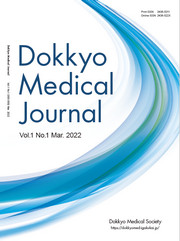3 巻, 2 号
選択された号の論文の12件中1~12を表示しています
- |<
- <
- 1
- >
- >|
Originals
-
原稿種別: Original
2024 年 3 巻 2 号 p. 77-87
発行日: 2024/06/25
公開日: 2024/09/13
[早期公開] 公開日: 2024/08/28PDF形式でダウンロード (282K) -
原稿種別: Original
2024 年 3 巻 2 号 p. 88-94
発行日: 2024/06/25
公開日: 2024/09/13
[早期公開] 公開日: 2024/09/03PDF形式でダウンロード (499K) -
原稿種別: Original
2024 年 3 巻 2 号 p. 95-104
発行日: 2024/06/25
公開日: 2024/09/13
[早期公開] 公開日: 2024/09/03PDF形式でダウンロード (267K) -
原稿種別: Original
2024 年 3 巻 2 号 p. 105-111
発行日: 2024/06/25
公開日: 2024/09/13
[早期公開] 公開日: 2024/08/28PDF形式でダウンロード (783K) -
原稿種別: Original
2024 年 3 巻 2 号 p. 112-122
発行日: 2024/06/25
公開日: 2024/09/13
[早期公開] 公開日: 2024/08/28PDF形式でダウンロード (235K) -
原稿種別: Original
2024 年 3 巻 2 号 p. 123-130
発行日: 2024/06/25
公開日: 2024/09/13
[早期公開] 公開日: 2024/08/28PDF形式でダウンロード (225K) -
原稿種別: Original
2024 年 3 巻 2 号 p. 131-139
発行日: 2024/06/25
公開日: 2024/09/13
[早期公開] 公開日: 2024/08/28PDF形式でダウンロード (347K)
Case Reports
-
原稿種別: Case Report
2024 年 3 巻 2 号 p. 140-145
発行日: 2024/06/25
公開日: 2024/09/13
[早期公開] 公開日: 2024/08/28PDF形式でダウンロード (1041K) -
原稿種別: Case Report
2024 年 3 巻 2 号 p. 146-151
発行日: 2024/06/25
公開日: 2024/09/13
[早期公開] 公開日: 2024/08/28PDF形式でダウンロード (544K) -
原稿種別: Case Report
2024 年 3 巻 2 号 p. 152-157
発行日: 2024/06/25
公開日: 2024/09/13
[早期公開] 公開日: 2024/08/28PDF形式でダウンロード (108K) -
原稿種別: Case Report
2024 年 3 巻 2 号 p. 158-161
発行日: 2024/06/25
公開日: 2024/09/13
[早期公開] 公開日: 2024/08/28PDF形式でダウンロード (259K) -
原稿種別: Case Report
2024 年 3 巻 2 号 p. 162-168
発行日: 2024/06/25
公開日: 2024/09/13
[早期公開] 公開日: 2024/08/28PDF形式でダウンロード (482K)
- |<
- <
- 1
- >
- >|
